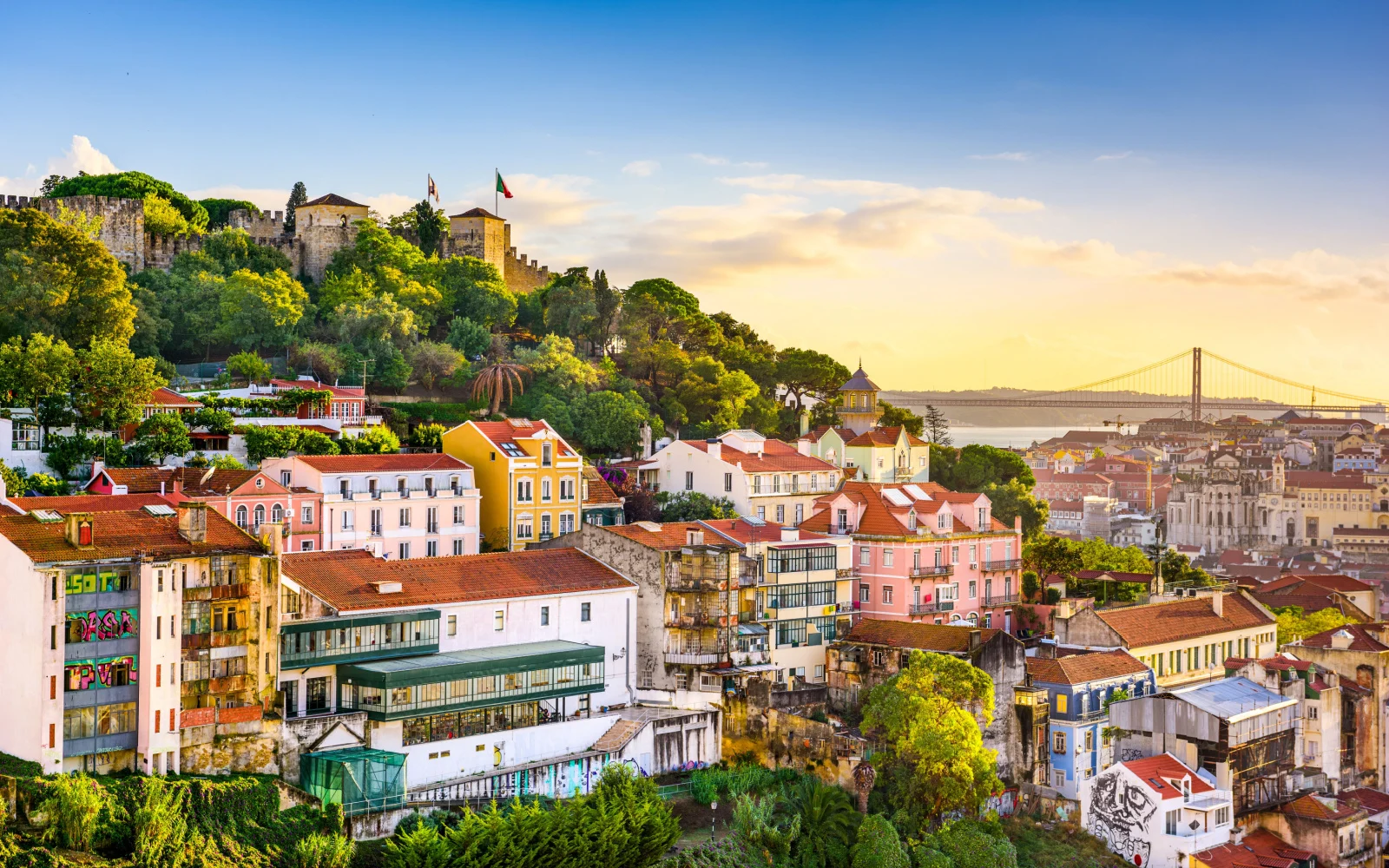Lisbon, the capital of Portugal, is quickly becoming a must-visit destination for European vacationers. The city and its surrounding region receive about 5.4 million international travelers each year.
When you visit Lisbon, you can spend hours getting lost in the hilly cobblestoned streets, admiring the pastel buildings, tiled facades, and iconic yellow trams, without any destination in particular.
The city also has some spectacular attractions, including the Castle of São Jorge, the 18th century square of Terreiro do Paço, and the UNESCO-protected Tower of Belém.
Lisbon is also a vibrant city with a great gastronomic scene that fuses the traditional and modern, an up-and-coming arts scene, and plenty of live music, including the traditional fado.
The fun lasts until late at night — if you take the right precautions to stay safe, of course. You may be wondering if Lisbon is safe to visit, since it is a big city as well as a popular tourist destination.
But don’t worry — we put together this travel guide to put your mind at ease with detailed information on any safety challenges, including crime, you may encounter while in Lisbon. Ready to dive in? So are we!
Is Lisbon Safe to Visit in 2024?
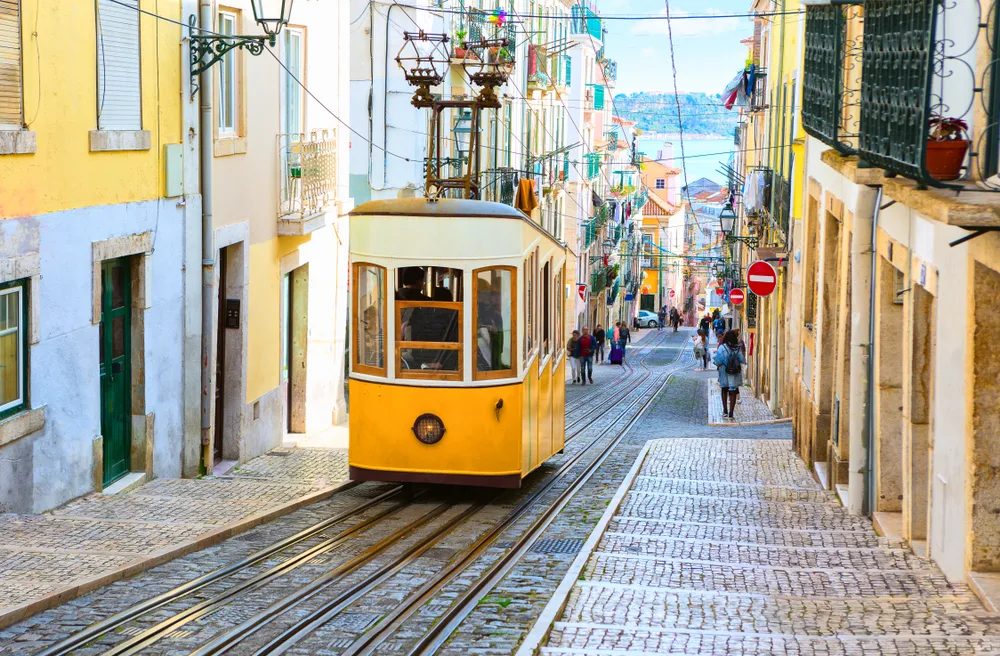
Nella/Shutterstock
Yes. Lisbon is one of the safest European capitals to visit. The city is friendly and welcoming to strangers and has a moderate crime rate.
You’re unlikely to encounter anything worse than some pickpocketing or petty theft, especially if you avoid sketchier areas. It makes sense that Lisbon is a safe city to visit because it is located in a safe country to visit.
Most travel advisories for Portugal tell tourists that the country is safe. The United States has Portugal under a Level One travel advisory, the lowest possible level for a travel advisory. That means that the country is very safe to visit, including Lisbon.
Of course, Lisbon still has problems that almost every capital city in the world has, including:
- Theft
- Scams
- Robberies
- Muggings
- Protests
Most travel advisories for Portugal, such as the one from the UK government, mention the risk of crime in Lisbon. Most criminal incidents are minor, but thieves do sometimes target tourists.
You don’t have to be hypervigilant against crime, but you should be aware that there is still some risk. Lisbon doesn’t have the reputation for violent protests that other European capitals, such as Paris, may have.
However, since it is the capital of the country, you may encounter protests.
Although most protests in Lisbon are peaceful, such as the April 2023 protests in response to the housing crisis, it is still a good idea to stay away from protests while traveling in case things turn negative quickly.
Major international events, such as the Catholic World Youth Day, are sometimes held in Lisbon. During those events, you can expect more crowds and the risk of counterprotests and political tension.
Research your travel dates ahead of time to make sure that your visit doesn’t coincide with an event such as that.
Lisbon has a mild Mediterranean climate, so you don’t have to worry about extreme weather and natural disasters, although the summers can get quite hot. The city is located in a seismic zone, so there is some risk of earthquakes.
However, most recent earthquake events have been tremors, and the risk of a severe earthquake such as the one that hit the city in 1755 is low.
Crime in Lisbon
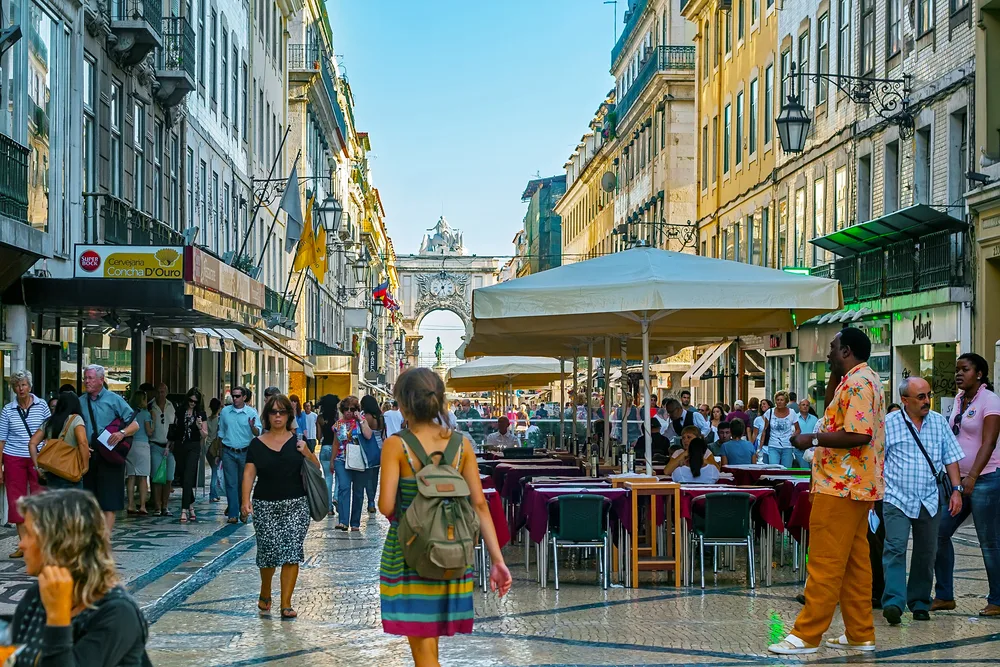
LISBON, PORTUGAL – SEPTEMBER 20, 2012: Rua Augusta Street in the evening, the Rua Augusta Arch, shops, tourists, cafes and restaurants outdoors in Lisbon, Portugal, September 20, 2012/Pani Garmyder/Shutterstock
Like any big city, Lisbon has its problems with crime. Some areas are grittier than others, with higher crime rates. However, as long as you use common sense when moving around the city and are aware of the crime risks, you shouldn’t encounter any major problems.
Lisbon has the highest crime rate in Portugal, which makes sense considering that it is the capital city and has the highest population.
However, compared to other big European cities, it has a far lower crime rate. Numbeo pegs its crime index score at 24.84 out of 100, a low value. There are positive trends regarding crime in Lisbon.
Although overall crime rose by about 3% in 2021, violent crime decreased by 6% that year. In 2022, violent crime only made up about 21% of total crimes committed in Lisbon. The most common violent crimes are robbery and robbery-related incidents.
Lisbon has never been a very violent city. Over the years, ever since the drop in crime after the 1990s, the homicide rate has hovered between 3 to 4 incidents per 100,000 people, which is a low value for such a big city.
Usually, low homicide rates are indicative of low rates of other violent crimes. Property crimes and other minor incidents make up the majority of crimes reported in Lisbon.
Crimes against property make up about 53% of total crimes committed. The most common forms of property crime are different types of theft, such as robbery in a public place, theft of unattended items, and pickpocketing.
In 2022, there were over 2,000 incidents of each of these criminal incidents. Theft in a motor vehicle is another very common form of crime in Lisbon.
In fact, it is the most common form of individual theft.
In 2022, there were 5,813 incidents of this crime alone. Many of these thefts target tourists. Lisbon receives a lot of tourists, especially in the summer, and the crowds provide perfect cover for pickpockets to snatch items unnoticed.
Plus, tourists tend to be less cautious than locals, making them easier targets. The good news is that most thefts are non-violent.
They are inconvenient and can ruin your vacation, but in the long run, you will not suffer physical harm. Lisbon is definitely a city where you will need to keep a close eye on your valuables (then again, you should be doing that everywhere that you go).
However, it is mostly a safe city to visit, although there are some neighborhoods with higher crime rates than others.
Petty Theft
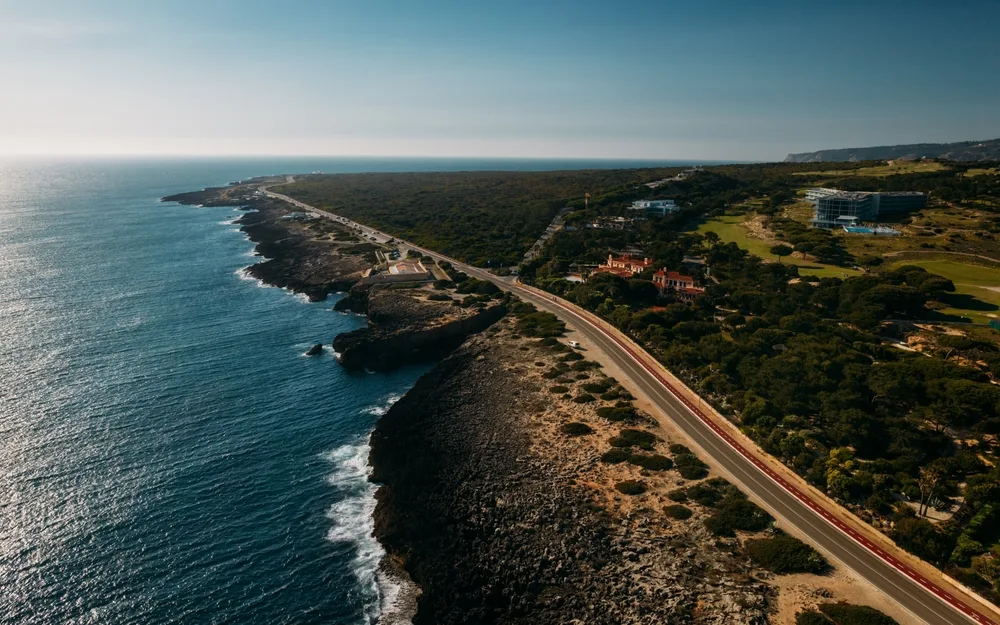
Alexandre Rotenberg/Shutterstock
Like in most European tourist destinations, petty theft is a common problem in Lisbon. Petty theft in many different forms abounds in Lisbon, including pickpocketing, bag snatching, scams, theft of unattended items, and theft from vehicles.
Thieves often target tourists, and pickpocketing is most common in areas that are popular among tourists such as beaches, tourist attractions, and certain lines of public transportation.
Many countries such as Canada include lists of theft hotspots in Lisbon in their travel advisory for Portugal.
Common theft hotspots in Lisbon and the greater Lisbon metro area are:
- Sintra
- Queluz
- The beaches of Guincho, Costa da Caparica, Cabo da Roca, and Boca do Inferno
- Cascais
- Castelo de São Jorge
- Belém
- Tram lines of E28, E25, and E15
On the beaches, thieves tend to rifle through people’s bags left on the shore. If you are taking advantage of Lisbon’s location on the coast to get some swimming time, make sure that you don’t leave your items unattended.
Either cover them with a towel, designate someone from your group as a bag-watching buddy (and rotate), or invest in a waterproof dive bag so you can take your things with you.
When walking through crowded tourist locations such as Belém or the main square, make sure that your valuables are hard to snatch. Never leave items unattended, even for a few seconds while you set up your phone for a timed selfie.
Put phones, wallets, and IDs in zipped compartments of your bag or front pants pockets, where a pickpocket can’t grab them unnoticed. Thieves often work in groups to scam tourists.
The UK government warns that you should beware of distraction tactics that pickpockets use to rob you, so be careful of people approaching you in public. If they seem too eager to talk to you, brush them off politely and move on.
Besides theft, you should be aware of scams in Lisbon.
The scams start before you even reach the country — online accommodation scams are becoming more and more common, so make sure that you book through a legitimate website, especially if you are paying a deposit.
Taxi drivers at the Lisbon Airport are notorious scammers, so always make sure the meter is on or you negotiate fare ahead of time.
Robbery
More violent incidents affecting tourists in Lisbon are rare, but they do happen. The most common violent crime affecting tourists in Lisbon is robbery.
Most incidents of robbery happen at night and in certain neighborhoods that are known to be riskier, so being smart about your movements after dark can help you prevent robberies.
The Australian government warns about the risk of robbery in Lisbon in its travel advisory for Portugal. Robbers usually operate around popular tourist areas after dark, especially near nightlife districts.
These areas may be safe overall, but you want to avoid walking down dark alleyways or side streets with few other people, even in neighborhoods that feel “safe.”
Many robbers target drunk visitors because they make easier targets since their reflexes are impaired. Others operate in bars and nightclubs and impair their victims by spiking drinks.
Although drink spiking is not very common in Lisbon, it still occurs. Make sure you are staying safe when exploring Lisbon’s nightlife. Try to go out with a group and make sure that you watch out for each other, and nobody wanders off alone.
Never leave your drinks unattended or accept drinks from strangers.
Be careful with how much you are drinking and drink a little less than you would at home — you don’t know how strong the drinks are, and you need to be less impaired than you would be in a place where you are familiar with your surroundings.
Avoiding Bad Areas
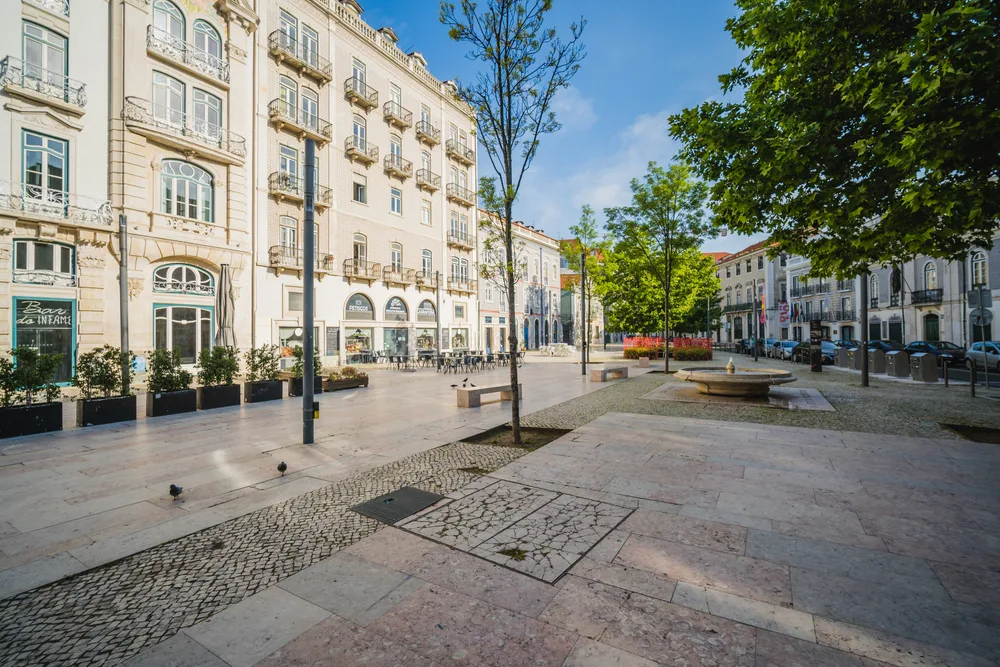
Intendente Square – Empty Lisbon, Portugal, During Coronavirus Lockdown / Pandemic, Morning, April 24, 2020/Goncalo_Castelo_Soares/Shutterstock
There are a few areas of Lisbon that have higher crime than others. The neighborhoods of Intendente, Martim Moniz, and Anjos are gentrifying neighborhoods that used to be known as Lisbon’s “red light district.”
They are ordinary working class neighborhoods, but some parts can be sketchy at night, so be careful when walking around after dark.
The area around Cais do Sodré is a popular nightlife area that can get a bit rowdy, so be careful if you’re passing there late at night. Chiado Plaza is not dangerous, but it has a reputation for drug-related activity.
Things to Consider
Here are a few additional safety tips for Lisbon:
- You may be approached by street scammers selling drugs. Say no and move on. Most of the “drugs” they are offering are crushed bay leaves or other pantry items.
- If you are the victim of a crime, go to the tourist police. Lisbon has a special tourist police office on Restauradores Square that can help you with insurance claims later on.
- If you’re renting a car, never leave belongings in your car. Thieves steal items from cars at popular tourist destinations such as nearby beach towns. The public transportation in the Lisbon area is great anyway, so you don’t even need a car to get around.
Frequently Asked Questions

Sean Pavone/Shutterstock
Here are a few common questions other visitors to Lisbon have asked before:
Is Lisbon friendly to foreigners?
For the most part, Lisbon is friendly to foreigners. Just be careful of people that are overly interested in you and your travel plans as they may be scammers.
What should I be careful of in Lisbon?
In Lisbon, you should be the most careful of pickpockets. Pickpocketing is the most common crime in the city and the one that affects tourists the most.
How many days is OK in Lisbon?
Three days in Lisbon is usually enough to get a taste for what the city has to offer. However, many people fall in love with the city and wind up moving there.
Is Lisbon or Porto safer?
Porto is safer than Lisbon as it has a lower crime rate (and is also a smaller city). However, Lisbon is not that dangerous either.
Is it OK to speak English in Lisbon?
Many people in Lisbon speak English due to the high number of tourists and expats. However, the official language is Portuguese and it’s polite to know at least a few words.
So, Is Lisbon Safe to Visit?
Lisbon is a safe city to visit as long as you take common sense precautions to protect your valuables. The crime rate is fairly low and violent crime is very rare.
So, with so much to see and do and a very safe overall environment, what are you waiting for — book your trip today and experience for yourself all that Lisbon has to offer. Happy travels!



